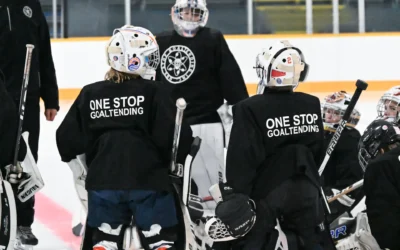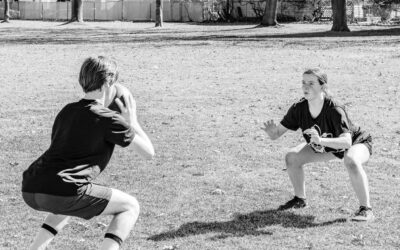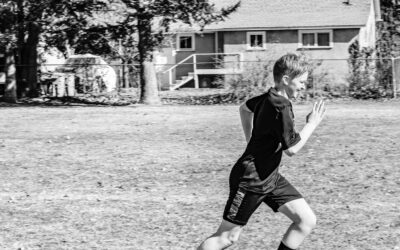1. Physical Conditioning
a. Strength and Endurance Training
As a goalie, your physical conditioning is crucial. As you gear up for tryouts, you need to start upping your off-ice training as well to put yourself in the best position possible. Whether you’ve been in the gym all summer or have taken the summer off, you need strength, agility, and endurance to have the best chance at tryouts, and consistency through the season. Here are some exercises to focus on:
- Leg Strength: Incorporate squats, lunges, and leg presses to build strong legs for quick movements and maintaining a low stance.
- Core Stability: Planks, Russian twists, and leg raises help develop core muscles, which are essential for balance and strength in the crease.
- Cardiovascular Endurance: Engage in activities like running, cycling, or swimming to improve overall stamina and help you stay sharp throughout the tryout session.
b. Goalie-Specific Drills
If you’re able to get on the ice with a private coach, goalie camp, or any ice at all before tryouts start, focus on the following:
(coaches love a goalie that can handle the puck}
- Movement Drills: Side-to-side shuffles and quick drops to work on your lateral movement and butterfly technique.
- Reactions: Use a reaction ball or work with a partner to improve your reflexes and hand-eye coordination.
- Puck Handling: Practice handling the puck, including passing, catching, and playing the puck behind the net.
2. Mental Preparation
a. Visualization Techniques
Visualization can help you perform at your best. Spend time imagining yourself in the crease, making key saves, and handling pressure situations. Picture yourself as calm, focused, and in control during the tryouts.
b. Goal Setting
Set realistic goals for your tryouts. Focus on aspects you can control, like working hard, maintaining a positive attitude, and demonstrating your skills.
c. Stress Management
Managing stress is essential for performing under pressure. Develop strategies such as deep breathing, meditation, or listening to calming music to help you stay relaxed and focused.
3. Equipment Check and Maintenance
This is an underrated aspect of getting ready for tryouts. You don’t want to show up and find out that your skates are sharp or you’re missing a screw on your helmet. Prepare beforehand and don’t forget your water bottle!
a. Gear Inspection
- Pads: Check for proper fit and repair any damage.
- Glove and Blocker: Make sure they are broken in and functional.
- Mask and Cage: Inspect for cracks or loose fittings.
- Skates: Sharpen them and check for any issues like loose blades or worn-out boot lining.
4. Game Day Preparation
a. Rest and Nutrition
Get a good night’s sleep before the tryout day and eat a nutritious meal. Don’t go to Mcdonald’s the day before or of your tryout, that’s not going to do you any favours.
b. Arrive Early
Arrive at the rink with plenty of time to spare. This gives you a chance to get mentally prepared, do a quick warm-up, and get comfortable before the tryouts begin. Go for a little jog, use tennis balls against the wall and/or with your blocker, do some stretching prior to getting on the ice.
One thing I liked to do was get dressed up to my pants, no skates or pads, and then go do some stretching and do some hand-eye work about 30 minutes before going on the ice. After about 10 minutes of that go get dressed, turn your mind off, have fun, and show that you want to be there. Body language is huge!
Remember, tryouts are not just about demonstrating your skills but also about showing your dedication, attitude, and potential as a team player.
Good luck at your tryouts! Keep practicing, stay focused, and most importantly, enjoy the game you love.



